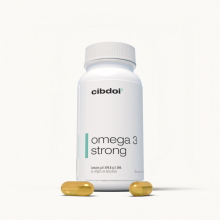Is Omega-3 Good for Sperm?
Published:
Omega-3 fatty acids provide a multitude of benefits for health, including enhancing heart, brain, eye and joint function. Some research also indicates omega-3s may improve sperm quality and fertility in men.
Contents:
- Why Sperm Health Matters for Fertility
- How Might Omega-3s Enhance Sperm Health?
- What Does Research Say About Omega-3s and Sperm?
- Why Don’t Omega-3s Boost Sperm in All Studies?
- Are There Risks With High Dose Omega-3 for Sperm?
- Optimal Omega-3 Intake for Male Fertility
- Lifestyle Factors Also Important for Sperm Health
- Is omega-3 good for sperm? Conclusion
With sperm counts progressively falling over the past 40 years, optimizing male fertility is important for couples trying to conceive. Could increasing omega-3 intake support better sperm health?
Below is a detailed look at the evidence on omega-3 fatty acids and their effects on sperm production, quality, motility and fertility in men.

Why Sperm Health Matters for Fertility
Sperm quality is a key factor in a man’s reproductive abilities. Poor sperm health can make conceiving more difficult for couples.
Parameters that characterize healthy sperm include:
- High sperm count – Having over 15 million sperm per mL semen. Low counts under 10 million reduce fertility.
- Good sperm motility – Percentage of sperm with excellent forward movement. At least 40% motility is optimal.
- Normal sperm morphology – Having mostly sperm with perfect shape and form. At least 4% normal morphology is ideal.
- Strong sperm DNA integrity – Low DNA damage or fragmentation. Fragmentation over 30% impairs fertility.
Additional determinants of male fertility include adequate semen volume, pH, consistency and low white blood cell contamination.
Optimizing diet, lifestyle and supplements to promote healthy sperm gives couples the best chances of conceiving sooner. Could omega-3s help improve sperm quality? Let’s analyze the evidence.
How Might Omega-3s Enhance Sperm Health?
Omega-3 fatty acids like EPA and DHA provide several beneficial influences that may aid sperm production and quality, including:
Anti-inflammatory effects – Inflammation damages sperm and testicular tissue. The potent anti-inflammatory properties of omega-3s protect sperm.
Increased blood flow – Omega-3s enhance circulation to the testes and genitourinary tract, ensuring oxygen and nutrient delivery.
Membrane stability – DHA maintains sperm cell membrane fluidity and integrity for motility and fertilizing ability.
Hormone optimization – Omega-3s ensure adequate androgen production from the hypothalamus, pituitary and testes.
Improved semen quality – Omega-3s enhance semen parameters like volume, pH and consistency for optimal fertilization conditions.
Through these mechanisms, maintaining sufficient omega-3 intake may support healthy sperm production, development and function for fertility.
What Does Research Say About Omega-3s and Sperm?
Numerous human clinical trials have analyzed the impact of omega-3 supplementation on sperm health in men:
- Sperm count - Many studies show significant increases in sperm concentration and count with omega-3 supplementation. Effects appear greater in infertile men.
- Sperm motility – Most research demonstrates improvements in sperm motility rates with omega-3s. However, a few studies found no change.
- Sperm morphology – Mixed results have been reported on changes in sperm shape and abnormality rates with omega-3 intake.
- DNA damage – Several studies report decreased sperm DNA fragmentation and oxidative damage after omega-3 supplementation.
- Fertilization capacity – Omega-3s increased in vitro fertilization rates in couples undergoing IVF treatment in a few studies.
Overall, omega-3 intake consistently appears to improve semen quality by increasing sperm count and motility. Benefits on morphology and fertility rates need further study but appear promising.
Why Don’t Omega-3s Boost Sperm in All Studies?
Some research shows neutral or insignificant effects on sperm with omega-3 supplementation. Potential reasons for inconsistent results include:
- Varying omega-3 dosages used
- Differences in study duration - at least 3 months may be needed
- Use of overall fish oil versus specific EPA/DHA amounts
- Lack of control for diet and lifestyle factors
- Occasional use of men with normal baseline sperm parameters
- Genetic differences influencing individual response
Well-controlled studies using sufficiently high doses of purified EPA/DHA in men with poor sperm quality can help clarify the true efficacy of omega-3s for improving sperm.
Are There Risks With High Dose Omega-3 for Sperm?
Human trials show doses up to 3 grams daily of combined EPA/DHA are safe for supporting sperm health and appear beneficial.
Potential side effects can include:
- Fishy aftertaste
- Gastrointestinal upset
- Loose stools
These are usually mild and often resolve with continued use. Taking fish oil with meals and starting with low doses helps minimize digestion issues.
Additionally, omega-3s may increase bleeding risk at very high intakes over 3 grams daily from supplements. This is likely only an issue for those already on blood thinners or with clotting disorders.
For otherwise healthy men, omega-3s are considered safe for optimizing fertility. Still, it’s wise to advise your doctor about use if planning conception.
Optimal Omega-3 Intake for Male Fertility
Human studies use varying doses of omega-3s, making specific fertility recommendations difficult. General guidelines include:
- Minimum Effective Dose - 500 mg EPA/DHA daily
- Moderate Dose - 1000-2000 mg EPA/DHA daily
- Therapeutic Dose - Up to 3000 mg EPA/DHA daily
To maximize male fertility benefits, an omega-3 supplement providing at least 2,000 mg combined EPA/DHA daily taken for a minimum of 3 months appears most effective.
Always choose a high-quality oil verified for purity. Look for at least a 2:1 ratio of EPA:DHA as well.
Lifestyle Factors Also Important for Sperm Health
In addition to omega-3s, adopting healthy lifestyle strategies should be part of any plan to optimize male fertility, including:
Avoid tobacco – Smoking is toxic to sperm and reduces count and motility.
Minimize alcohol – Heavy alcohol intake lowers testosterone and impairs sperm production.
Get active – Regular exercise enhances testosterone levels and circulation to the genitals.
Lose excess weight – Obesity negatively impacts sperm and testosterone.
Reduce stress – High stress hormone levels impair fertility. Practice relaxation techniques.
Wear loose underwear – Tight shorts elevate testicular temperature which reduces sperm production.
Get enough vitamin D – Adequate vitamin D levels are linked to better semen quality.
Limit toxic exposures – Avoid recreational drugs, excess medications and environmental toxins which damage sperm.
Following a healthy diet and active lifestyle provides the foundation. Omega-3s may offer additional fertility benefits from this healthy baseline.
Is omega-3 good for sperm? Conclusion
In summary, a growing body of research indicates omega-3 fatty acid supplements may enhance sperm quality, quantity, motility and fertility capacity in men.
Not all studies demonstrate clear benefits. However, omega-3s consistently appear most effective for raising low sperm count and motility - two key determinants of male fertility.
For men with poor semen parameters, taking 2,000-3,000 mg daily of combined EPA and DHA omega-3s for at least 3 months is recommended.
Omega-3s are safe, natural and affordable. When combined with a healthy diet and lifestyle, they provide a wise adjuvant therapy for optimizing male fertility and improving chances of conception.















